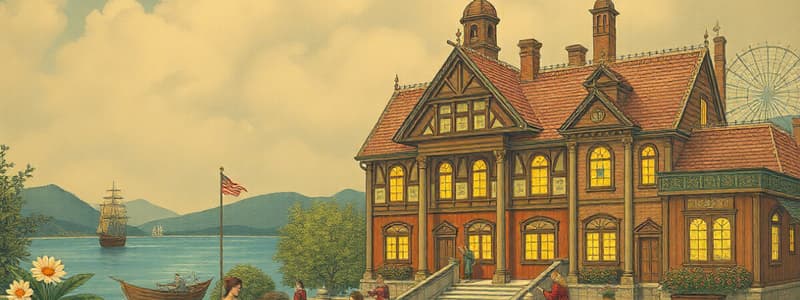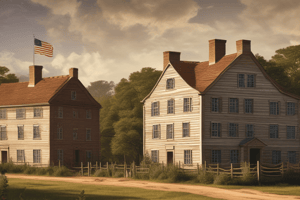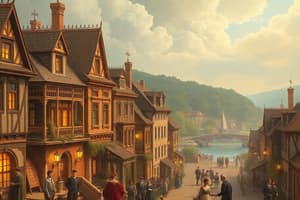Podcast
Questions and Answers
Which of the following events reflects the controversies in the history of the United States?
Which of the following events reflects the controversies in the history of the United States?
- The Industrial Revolution
- The Civil Rights Movement (correct)
- The signing of the Constitution
- The Apollo Moon Landing
What concept is commonly associated with the ideal of the United States as a place of success and potential?
What concept is commonly associated with the ideal of the United States as a place of success and potential?
- Colonial Expansion
- Noble Savage
- American spirit (correct)
- European Immigration
Which of the following statements is true regarding Christopher Columbus's arrival in the Americas?
Which of the following statements is true regarding Christopher Columbus's arrival in the Americas?
- He discovered North America in 1492.
- He was the first European to set foot in the New World.
- He established the first colony in the Americas.
- There were already people inhabiting the lands he arrived at. (correct)
What does the term 'melting pot' refer to in the context of the United States?
What does the term 'melting pot' refer to in the context of the United States?
How did ancient indigenous peoples arrive in the Americas according to anthropologists?
How did ancient indigenous peoples arrive in the Americas according to anthropologists?
Which European countries were involved in exploring the Americas during the age of discovery?
Which European countries were involved in exploring the Americas during the age of discovery?
What did stories of cities made of gold represent during the exploration of the New World?
What did stories of cities made of gold represent during the exploration of the New World?
What was a significant outcome of the establishment of permanent colonies in the United States?
What was a significant outcome of the establishment of permanent colonies in the United States?
What was the fate of the Roanoke colony that John White returned to find?
What was the fate of the Roanoke colony that John White returned to find?
Which leader was sent to establish the Jamestown colony?
Which leader was sent to establish the Jamestown colony?
What significant action did George Washington take during the Revolutionary War?
What significant action did George Washington take during the Revolutionary War?
What was the primary reason for the War of 1812?
What was the primary reason for the War of 1812?
What did the Indian Removal Act of 1830 aim to achieve?
What did the Indian Removal Act of 1830 aim to achieve?
What significant legal change occurred in 1808 regarding slavery?
What significant legal change occurred in 1808 regarding slavery?
What initiated the Civil War in 1861?
What initiated the Civil War in 1861?
Who surrendered at Appomattox Courthouse, signaling the end of the Civil War?
Who surrendered at Appomattox Courthouse, signaling the end of the Civil War?
Which invention is NOT mentioned as life-changing in the post-Civil War era?
Which invention is NOT mentioned as life-changing in the post-Civil War era?
What year was the U.S. Constitution ratified?
What year was the U.S. Constitution ratified?
When did women earn the right to vote in the United States?
When did women earn the right to vote in the United States?
What was a common consequence of Jim Crow Laws in the South?
What was a common consequence of Jim Crow Laws in the South?
What was one of the primary reasons many Europeans migrated to America in the 1600s?
What was one of the primary reasons many Europeans migrated to America in the 1600s?
What economic event occurred on October 24, 1929?
What economic event occurred on October 24, 1929?
Which natural disaster compounded the economic difficulties of the Great Depression?
Which natural disaster compounded the economic difficulties of the Great Depression?
What program was NOT enacted to aid recovery from the Great Depression?
What program was NOT enacted to aid recovery from the Great Depression?
What event prompted the United States to enter World War II?
What event prompted the United States to enter World War II?
What was a significant social change on the American home front during World War II?
What was a significant social change on the American home front during World War II?
What was a direct consequence of the U.S. dropping atomic bombs on Japan?
What was a direct consequence of the U.S. dropping atomic bombs on Japan?
Which civil rights leader was associated with advocating for the Civil Rights Act of 1964?
Which civil rights leader was associated with advocating for the Civil Rights Act of 1964?
Which event occurred last among those listed?
Which event occurred last among those listed?
What terrorist group was responsible for the September 11 attacks in 2001?
What terrorist group was responsible for the September 11 attacks in 2001?
What was one of the immediate actions taken by the U.S. after the 9/11 attacks?
What was one of the immediate actions taken by the U.S. after the 9/11 attacks?
Which U.S. president declared the official end of the war in Afghanistan in 2014?
Which U.S. president declared the official end of the war in Afghanistan in 2014?
What major event did the U.S. experience on a clear September morning in 2001?
What major event did the U.S. experience on a clear September morning in 2001?
Which development signified growing U.S. patriotism in the years following September 11, 2001?
Which development signified growing U.S. patriotism in the years following September 11, 2001?
The Great Depression forced the United States government to create which of the following?
The Great Depression forced the United States government to create which of the following?
Flashcards
Melting Pot
Melting Pot
The process by which people from different parts of the world came to live in the United States, leading to a diverse population.
Indigenous Peoples
Indigenous Peoples
Groups of people who were the original inhabitants of North and South America before European arrival.
American Dream
American Dream
The belief that America offers opportunities for success and prosperity to everyone, regardless of background.
Colonialism
Colonialism
Signup and view all the flashcards
Bering Strait Migration
Bering Strait Migration
Signup and view all the flashcards
Staking a Claim
Staking a Claim
Signup and view all the flashcards
Jamestown Colony
Jamestown Colony
Signup and view all the flashcards
Christopher Columbus Discovered America?
Christopher Columbus Discovered America?
Signup and view all the flashcards
Roanoke Colony
Roanoke Colony
Signup and view all the flashcards
Pilgrims
Pilgrims
Signup and view all the flashcards
Primogeniture
Primogeniture
Signup and view all the flashcards
French and Indian War
French and Indian War
Signup and view all the flashcards
Revolutionary War
Revolutionary War
Signup and view all the flashcards
Declaration of Independence
Declaration of Independence
Signup and view all the flashcards
U.S. Constitution
U.S. Constitution
Signup and view all the flashcards
George Washington
George Washington
Signup and view all the flashcards
War of 1812
War of 1812
Signup and view all the flashcards
Trail of Tears
Trail of Tears
Signup and view all the flashcards
Slavery
Slavery
Signup and view all the flashcards
Civil War
Civil War
Signup and view all the flashcards
Jim Crow Laws
Jim Crow Laws
Signup and view all the flashcards
The Gilded Age
The Gilded Age
Signup and view all the flashcards
Great Depression
Great Depression
Signup and view all the flashcards
Dust Bowl
Dust Bowl
Signup and view all the flashcards
U.S. Government's Response
U.S. Government's Response
Signup and view all the flashcards
Pearl Harbor Attack
Pearl Harbor Attack
Signup and view all the flashcards
World War II
World War II
Signup and view all the flashcards
American Home Front
American Home Front
Signup and view all the flashcards
The Holocaust
The Holocaust
Signup and view all the flashcards
End of WWII in Europe
End of WWII in Europe
Signup and view all the flashcards
Atomic Bombs
Atomic Bombs
Signup and view all the flashcards
Civil Rights Act of 1964
Civil Rights Act of 1964
Signup and view all the flashcards
Cold War
Cold War
Signup and view all the flashcards
9/11 Attacks
9/11 Attacks
Signup and view all the flashcards
War on Terror
War on Terror
Signup and view all the flashcards
9/11 Legacy
9/11 Legacy
Signup and view all the flashcards
Study Notes
US History Overview
- The US, while a beacon of freedom and opportunity, has a complex and controversial past.
- From colonialism and slavery to the Civil Rights Movement, the nation's history reveals periods of both progress and repression.
- The US, a melting pot, has experienced periods of social unrest.
- The US was populated by indigenous people long before European arrival.
European Colonization
- Christopher Columbus's arrival in 1492 was not the first European contact.
- Norse and Viking explorers had arrived in the Americas beforehand.
- European explorers were attracted by the claimed riches of the New World, though exaggerated stories existed.
- Several European nations (Spain, England, Italy, France, and Portugal) established colonies.
- England's first permanent colony in present-day Virginia was established.
- The Roanoke colony mysteriously vanished in 1587.
- Jamestown, established in 1604, marked continued colonization efforts.
- Motivations for colonization included escaping economic hardship and religious persecution (Pilgrims in Plymouth Rock in 1620).
- Land scarcity in England and primogeniture (inheritance by the firstborn son) drove many to seek opportunities in the Americas.
- By the mid-1700s, European colonies thrived along the North American east coast.
Revolutionary War and Early Nationhood
- George Washington played a key role in the French and Indian War (1754-1763), a prelude to the Revolutionary War.
- Colonists grew dissatisfied with British rule and taxation without representation.
- The Declaration of Independence was issued in 1776.
- The US Constitution was ratified on September 17, 1787.
- Washington became the first US president.
- Post-independence, the US faced conflict with the British in the War of 1812.
19th Century Challenges
- Indigenous peoples were displaced through policies like the Indian Removal Act of 1830.
- The Trail of Tears resulted in the forced relocation and death of thousands of Native Americans.
- The institution of slavery fueled tensions between the North and South.
- The Civil War (1861-1865) ensued with significant casualties.
- The war ended with the Confederacy's defeat and the emancipation of over four million slaves.
Industrialization and Discrimination
- The late 1800s saw rapid US industrialization.
- Despite progress, minorities (African Americans, Native Americans, and women) faced continuous discrimination.
- Jim Crow Laws restricted Black people's rights.
- African Americans were granted suffrage in 1870 but faced ongoing barriers to voting rights.
Economic Turmoil and World Wars
- The Great Depression (1929) and the Dust Bowl (1930s) severely impacted the US economy and daily life.
- The US entered World War II after the Pearl Harbor attack (December 7, 1941).
- The war resulted in major loss of life and significant military engagement globally.
- The atomic bombings of Hiroshima and Nagasaki ended the war in the Pacific.
Post-War America and Civil Rights
- The US experienced significant postwar growth but minorities faced discrimination.
- The Civil Rights Act of 1964 aimed to end segregation and discrimination.
- Significant political assassinations in the 1960s led to social turmoil.
Post-9/11 America
- The terrorist attacks of September 11, 2001, significantly altered US security, immigration, and foreign policy.
- The US waged wars against terrorism in Afghanistan and Iraq.
- The US withdrew troops from Afghanistan in 2014, marking the official end of the war.
Current Challenges
- Despite progress, the US continues to face political, social, and economic issues.
- Societal divisions remain prevalent.
Studying That Suits You
Use AI to generate personalized quizzes and flashcards to suit your learning preferences.
Description
Explore the intricate history of the United States, from its diverse indigenous roots to European colonization and the struggles for freedom. This quiz covers significant events and influences that shaped the nation, including the arrival of Columbus and the establishment of early colonies. Understand how these historical dynamics laid the groundwork for both progress and conflict in America.




